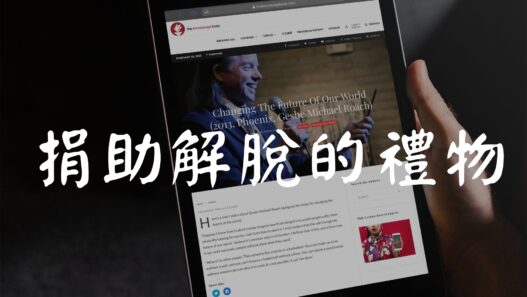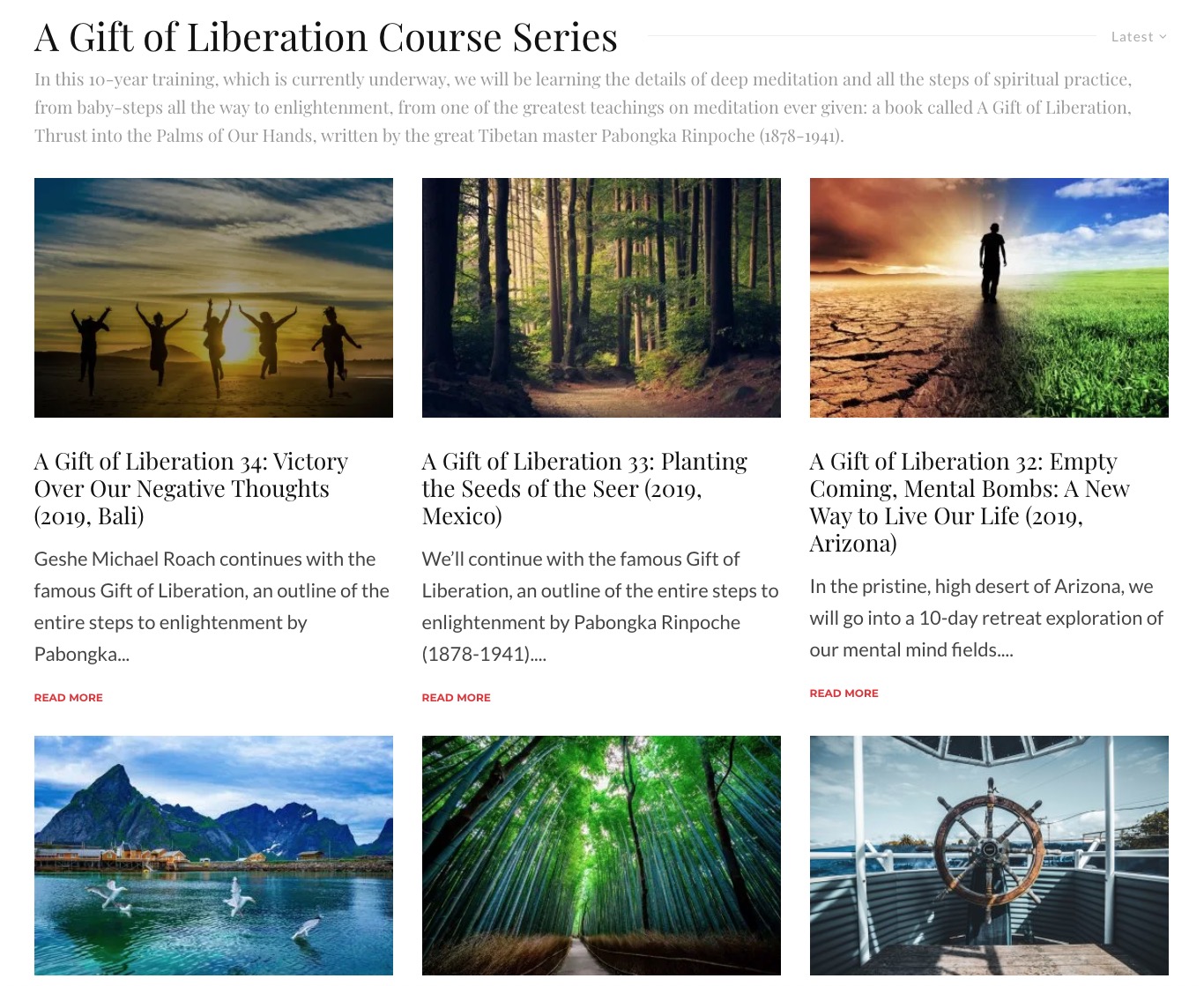掌中解脱 第42期: 梦想的力量: 将伟大的想法带入生活
步步上道的教授一直在帮助我们减少自我珍爱,并重新专注于服务他人,从而培养我们的善心。 我们一直在练习施与受、自他交换,并且开始深入研究意识练习(Lojong)。 我们现在已经得到了深入的教授:如果我们努力练习,特别是在困难时期,那么我们的努力就会变得异常强大、有效以及富有成效。
通过练习和训练,即使在困难时期,我们也可以将周围任何可怕或不利的情况转化为证悟之道。 时间使我们的努力更加坚强、更加成功。 此类培训的传承非常悠久,并且拥有良好的记录。 它的成功实践给我们带来了满足和无所畏惧。 那么问题来了,我们应该练习什么呢? 我们应该如何训练呢?
格西麦克·罗奇将继续教导我们传承并帮助我们沿着帕绷喀仁波切在 24 天的 22 条修行戒律中行走。
22 个培训提示可能看起来像代码。例如,其中一个是,“站在喜悦之流中。” 要理解这些教授并马上知道如何应用在生活中不总是容易的事。格西麦克将为我们解读这些代码并展示如何将它们应用在生活中。
来自TKB的消息:
这个项目还在持续进行中,仍在编辑所有的中文音频和视频。
总共有8 种语言,超过 150 个音频和视频文件需要编辑,因此需要花些时间。
当我完成每一堂课时,会上传到在这里和 Youtube 上,所以请持续查看更新内容。
视频
是一个视频播放列表,从最近发布的课程开始。只需点击观看下一个视频,即可观看本系列的其他视频。
音频
这是我们第42期道次第静修营,迄今为止这已经是我们道次第学习的第十个年头了。点击下面的图标,你可以看到本系列的所有其他教授。
掌中解脫 第42期: 夢想的力量: 把偉大的想法帶進生活
步步上道的教導一直在幫助我們減少自我關注,重新專注於為他人服務,進而培養我們的善心。我們一直在練習施與受、自他交換,並開始深入地學習修心。現在,我們得到深刻的教授:如果我們努力練習,尤其是在困難時期,那我們的練習就會變得異常強大、有效和富有成果。
透過練習和訓練,即使在困難時期,我們也能將周圍任何可怕或不利的情況轉化為通往證悟的道路。困難時期會讓我們的努力更加堅定、更加成功。這種訓練的傳承非常悠久,而且有跡可循。它的成功實踐為我們帶來了滿足和無畏。問題來了,我們應該練習什麼?應該如何訓練?
格西麥可・羅區將繼續為我們教授,並幫助我們沿著帕繃卡仁波切在他的24 天教學中為我們制定的22 條訓練戒律,沿著修行之路前行。
22 個培訓提示可能看起來像代碼。例如,其中一個是,「站在喜悅之流中。」 要理解這些教授並馬上知道如何應用在生活中不總是容易的事。格西麥克將為我們解讀這些代碼並展示如何將它們應用在生活中。
我們的大且刻薄的總裁為我們前世慈祥、慈愛的母親。 我們會把一位幼小、需要幫助的孩子想像成我們的母親。 我們將把自他交換提升到一個新的、更高的水準。
來自TKB的消息:
這個項目還在持續進行中,仍在編輯所有的中文音頻和視頻。
總共有8 種語言,超過 150 個音頻和視頻文件需要編輯,因此需要花些時間。
當我完成每一堂課時,會上傳到在這里和 Youtube 上,所以請持續查看更新內容。
視頻
是一個視頻播放列表,從最近發布的課程開始。只需點擊觀看下一個視頻,即可觀看本系列的其他視頻。
音頻
冥想視頻
是一個視頻播放列表,從最近發布的課程開始。只需點擊觀看下一個視頻,即可觀看本系列的其他視頻。
這是我們第42期道次第靜修營,迄今為止這已經是我們道次第學習的第十個年頭了。點擊下面的圖標,你可以看到本系列的所有其他教授。
In our journey on The Steps on the Path have we’ve been learning to develop our kindness and compassion by reducing our self-cherishing and re-focusing us on efforts to serve others, We’ve discovered the profound impact of traditional Tibetan teachings, specifically Lojong and Tonglen practices. These teachings guide us from a self-centered worldview toward a life dedicated to serving others, especially during challenging times. By embracing difficulties as opportunities for growth, we can turn any situation into a step on our path to enlightenment.
At the heart of these teachings is the principle that adversity strengthens our spiritual practice, making it more effective and rewarding. This approach is rooted in a long lineage of proven success, promising us contentment and fearlessness in the face of life’s uncertainties.
So, what practices can lead us through this transformative journey? How do we train our minds and hearts to embody these teachings?
During ‘The Power To Dream’ event in Kyoto, Japan, Geshe Michael Roach continued teaching us this lineage to help us travel along the steps of the path. He will explore the 22 training precepts from Pabongka Rinpoche’s “Gift of Liberation Thrust into the Palm of Your Hand”. These precepts, while seemingly cryptic—such as “Stand in the stream with joy”—are keys to integrating this deep spiritual wisdom into our daily lives. Geshe Michael will decode these teachings for us, offering practical advice on how to apply them every day.
This course is the 42nd retreat and a continuation of our study of the Gift of Liberation Thrust into the Palm of Your Hand by Pabongka Rinpoche.
Videos
This is a video playlist starting with the most recently posted class. Just click for the next video to see additional videos in the series.
Audio
This is such an important and beautiful teaching that I thought many of you would like to go deeper and learn more about the practice of Developing the Good Heart (Lojong). There’s a really great ACI Course from 1998 where Geshe Michael teaches an entire course on Developing the Good Heart (Lojong). You’ll find the link to this course below the audio playlist and a lot of information to go deeper on this practice.
Want to go deeper on the practice of Developing the Good Heart?
This 14th course of the ACI In-Depth Course Series presents classical advices on how to be a good person, and is based upon A Compendium of Texts on Developing the Good Heart (Lojong Gyatsa) by Muchen Konchok Gyeltsen (1300 AD). Lojong texts from the Compendium include: The Eight Verses (Tsik- gye Mar ) by Dorje Seng-ge (1044- 1123), the Wheel of Knives (Tsoncha Korlo) by Master Dharma Rakshita (1000 AD), Seven- Step Practice for Developing the Good Heart (Lojong Dun Dunma) by Geshe Chekawa (1101- 1175), The Advices of the Victorious One (Danlak) by Gyalwa Yang Gunpa (1213- 1258), and Freedom from the Four Attachments (Shenpa Shi-drel ) by Sachen Kunga Nyinpo (1092- 1158).
Topics include: How to develop a good heart, how to practice throughout the day, how to develop the wish for enlightenment, the eight verses of mind training, 18 pledges for developing a good heart, the six keys to successful practice, the five powers, the five mental poisons, seven steps to developing a good heart, the three virtues, how to respond to the eight worldly thoughts, the real meaning of freedom from attachment, how to behave in difficult situations, the difference between how things happen and why things happen, how to send your mind into death (powa), and seeing angels.
- 龍樹菩薩的智慧課程6:藥師佛與龍樹大師的智慧的靜修營 (2023, Arizona) - 1 4 月, 2025
- Idims: 掌中解脫 第42期: 夢想的力量: 把偉大的想法帶進生活 (2023, Kyoto) - 29 3 月, 2025
- Idims: 掌中解脫 第44期: 喜悅的火花 (2024, Kyoto) - 26 3 月, 2025














